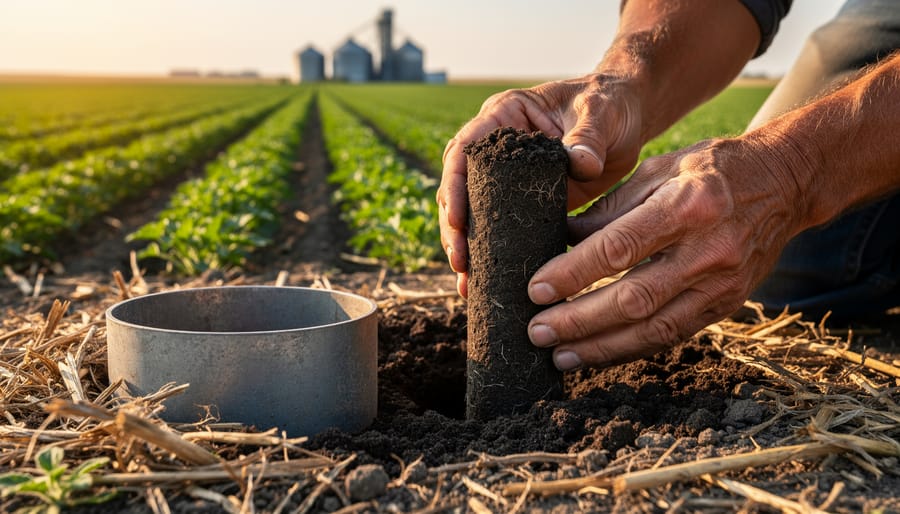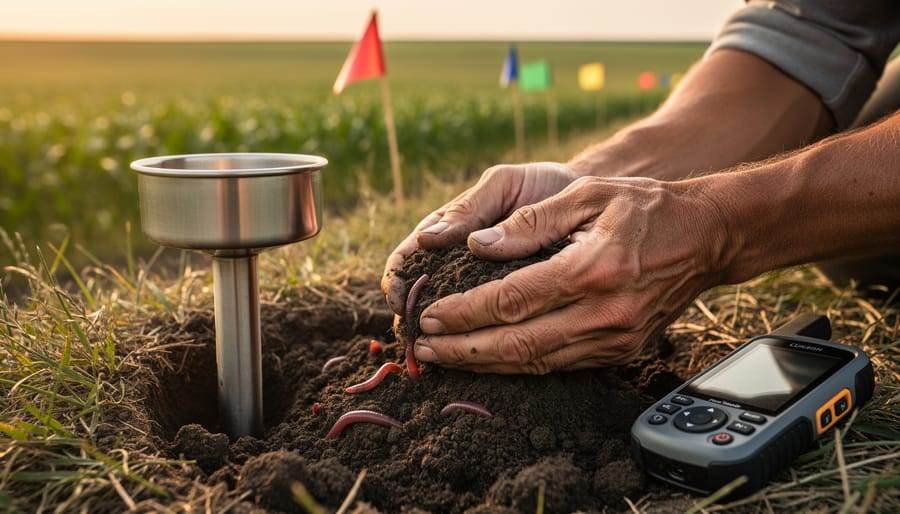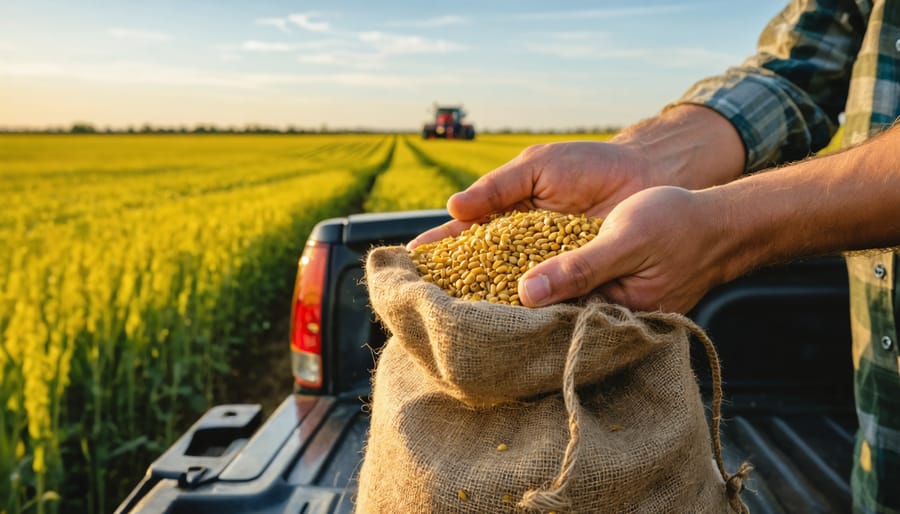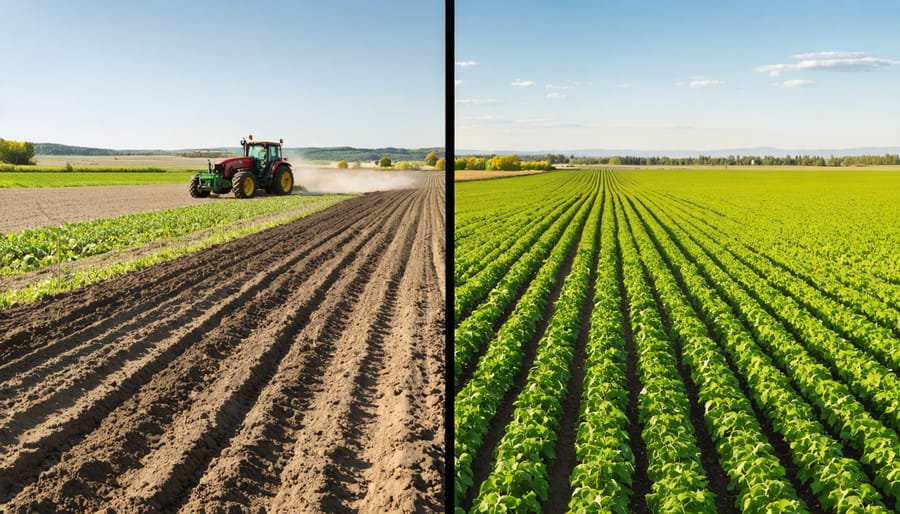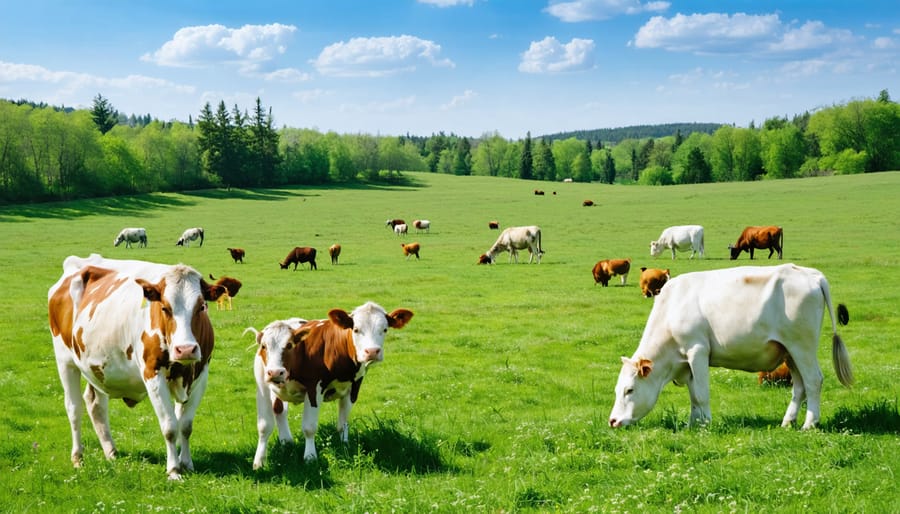Organic certification transforms your farming operation into a premium-value enterprise while building trust with consumers who increasingly demand transparency in food production. Alberta farmers navigating the certification process face unique challenges, from documenting field histories to maintaining detailed records of inputs and harvests. The path to certification, though rigorous, opens doors to growing markets and price premiums of 20-50% above conventional products. Whether you’re managing a small-scale vegetable operation or a large grain farm, understanding the certification requirements early in your journey saves time, reduces stress, and positions your farm for long-term success in Canada’s expanding organic market.
For Alberta producers, certification involves partnering with accredited bodies like PACS (Pacific Agricultural Certification Society) or Ecocert Canada, who verify compliance with the Canadian Organic Standards. These standards encompass soil management, pest control, and crop rotation practices that protect both environmental integrity and consumer confidence. Recent data shows organic farm revenues in Alberta growing by 15% annually, making certification an increasingly valuable investment for forward-thinking farmers committed to sustainable agriculture.
The Digital Evolution of Organic Certification
From Paper to Digital: The Modern Certification Process
Today’s organic certification process has evolved significantly from the paper-heavy systems of the past. Alberta farmers are now embracing modern digital documentation systems that streamline record-keeping and enhance transparency.
Most certification bodies now accept digital records through secure online portals, where farmers can upload field histories, input records, and harvest data. These platforms typically include features like automated reminder systems for important deadlines and digital signature capabilities for verification purposes.
The transition to digital has brought several advantages for Alberta producers. Real-time data tracking helps maintain accurate records of crop rotations, pest management strategies, and soil amendments. Cloud storage ensures documents are safely preserved and easily accessible during inspections. Many farmers report saving 5-10 hours weekly on administrative tasks after switching to digital systems.
For those new to digital documentation, local organic associations offer training workshops and one-on-one support to help navigate these tools. The investment in learning these systems pays off through reduced paperwork, improved organization, and easier compliance tracking.

Key Data Points in Organic Certification
During the organic certification process, farmers need to maintain detailed records of several critical data points. Your farm’s history, including previous land use and chemical applications over the past three years, forms the foundation. Comprehensive field maps showing buffer zones, neighbouring properties, and water sources are essential documentation.
Production records must detail seed sources, planting dates, and crop rotation plans. For livestock operations, you’ll need animal health records, feed purchase receipts, and grazing rotation schedules. Keep thorough documentation of all inputs used, including organic fertilizers, pest control methods, and soil amendments.
Sales and financial records are equally important. Track harvest yields, storage methods, and sales receipts. For processed products, maintain documentation of ingredients, processing methods, and packaging materials.
Here in Alberta, many successful organic farmers use digital record-keeping systems to streamline this process. Local organic inspector Sarah Thompson notes, “Good record-keeping isn’t just about certification – it helps farmers make better management decisions and improve their operations year after year.”
Remember to document any challenges or unusual events affecting your operation, as this information can be valuable during your annual inspection.
Data Privacy Standards for Alberta’s Organic Farmers
Provincial Privacy Requirements
In Alberta, organic farm certification requires careful attention to privacy regulations, particularly when handling sensitive farm data and personal information. The Alberta Personal Information Protection Act (PIPA) governs how private sector organizations collect, use, and disclose personal information, directly impacting organic certification processes.
As an organic farmer in Alberta, you must maintain detailed records of your operations while ensuring compliance with privacy laws. This includes protecting information about your farming practices, soil management strategies, and pest control methods. Additionally, any employee information, supplier details, and certification documentation must be stored securely.
Key privacy requirements for Alberta organic farms include:
– Obtaining consent before collecting personal information
– Implementing reasonable security measures to protect stored data
– Limiting access to confidential information to authorized personnel only
– Maintaining accurate records of how personal information is used
– Developing clear procedures for handling privacy breaches
To meet these requirements, consider implementing:
– Secure filing systems for physical documents
– Password-protected digital storage solutions
– Regular staff training on privacy protocols
– Clear privacy policies for sharing information with certification bodies
– Documented procedures for information disposal
Remember that certification bodies must also comply with these privacy regulations when handling your farm’s information. It’s recommended to discuss privacy protection measures with your certifying body and ensure their practices align with provincial requirements. Regular audits of your privacy practices can help maintain compliance and build trust with stakeholders.
When in doubt about specific privacy requirements, consult with Alberta’s Office of the Information and Privacy Commissioner or seek legal counsel specializing in agricultural privacy law.
Federal Standards and PIPEDA Compliance
When pursuing organic certification in Canada, farmers must comply with federal privacy standards and the Personal Information Protection and Electronic Documents Act (PIPEDA). This legislation affects how certification bodies and farmers handle sensitive information throughout the certification process. As you work towards meeting Canadian organic standards, you’ll need to ensure proper management of personal and business data.
Key privacy requirements include secure storage of farm records, confidential handling of inspection reports, and protection of proprietary farming practices. Certification bodies must obtain explicit consent before sharing any information about your operation with third parties, except when required by law or regulatory oversight.
For Alberta farmers, this means:
– Maintaining detailed records in secure, access-controlled locations
– Implementing data protection measures for digital documentation
– Ensuring staff members understand privacy obligations
– Establishing clear protocols for sharing information with inspectors
– Regularly reviewing and updating privacy practices
Your certification body will provide specific guidelines for compliance, but it’s important to develop your own privacy framework that works for your operation. Consider investing in secure digital storage solutions and training staff on privacy best practices. Many Alberta producers find success by integrating privacy measures into their existing record-keeping systems, making compliance a natural part of daily operations.
Remember that protecting sensitive information isn’t just a legal requirement – it’s also essential for maintaining trust with customers, suppliers, and certification partners. Regular privacy audits can help ensure continued compliance while protecting your farm’s valuable information assets.
Practical Data Protection Strategies
Secure Record-Keeping Systems
Modern organic certification requires robust record-keeping systems that protect sensitive farm data while ensuring compliance with Canadian regulations. Digital tools have revolutionized how farmers maintain their organic compliance strategies, making documentation more efficient and secure.
Cloud-based systems like FarmManager and AgriXP offer encrypted storage solutions specifically designed for Canadian organic producers. These platforms allow farmers to track crop rotations, input applications, and harvest records while maintaining data privacy. Many Alberta farmers find success using a combination of digital and traditional methods, keeping both electronic records and paper backups.
Essential record-keeping practices include:
• Regular data backups (at least monthly)
• Password protection for all digital files
• Secure storage of physical documents
• Clear documentation procedures for staff
• Systematic file naming conventions
Local agricultural extension offices recommend implementing a three-tier storage system:
1. Daily digital entries through mobile apps
2. Weekly backups to secure cloud storage
3. Monthly printouts of critical documentation
Remember to maintain records for at least five years, as required by certification bodies. Consider investing in automated backup systems and training staff on proper data entry protocols. Many successful Alberta organic operations schedule monthly record reviews to ensure completeness and accuracy, making certification inspections smoother and more predictable.
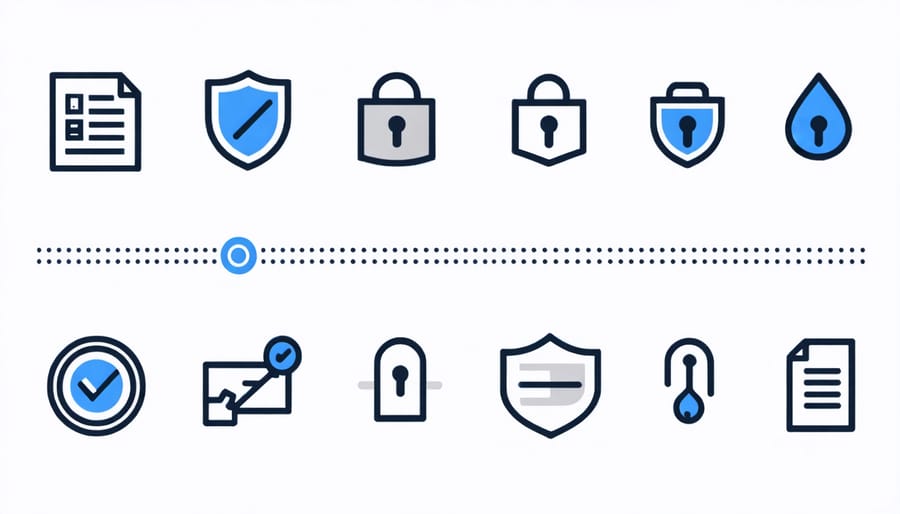
Access Control and Data Sharing
Access to certification information requires careful management to protect sensitive farm data while ensuring transparency throughout the organic certification process. In Alberta, farmers work closely with certification bodies to establish clear protocols for sharing documentation and inspection results.
A tiered access system is typically implemented, where different stakeholders have varying levels of access to certification records. Primary certificate holders (farmers) maintain full access to their documentation, while certification bodies, inspectors, and regulatory authorities have specific permissions based on their roles.
Farm operators can designate authorized representatives to handle certification paperwork and communications. This proves particularly helpful for larger operations or family farms where multiple individuals share management responsibilities. Many Alberta farmers find that establishing a dedicated team member to oversee certification records streamlines the process.
Digital record-keeping systems are becoming increasingly common, offering secure platforms for storing and sharing certification data. These systems often include features like audit trails and automated backup, helping farms maintain compliance while protecting sensitive information.
When sharing certification details with buyers or processors, farmers can provide verification through standardized documentation without exposing confidential operational information. This balanced approach maintains market transparency while safeguarding proprietary farming practices.
Remember to regularly review and update access protocols, especially when staff changes occur or new business relationships develop. Your certification body can provide guidance on best practices for managing information access within your specific context.
Data Breach Prevention
In today’s digital age, protecting your organic certification data is just as important as safeguarding your crops. Here in Alberta, we’ve seen how proper data management can make or break a farm’s certification process. To keep your certification information secure, start by implementing a robust filing system that separates sensitive documents from general farm records.
Create strong passwords for all digital records and change them every three months. Consider using a password manager to keep track of these securely. When sharing certification documents with inspectors or certification bodies, use encrypted email services or secure file-sharing platforms.
Keep detailed logs of who accesses your certification documents and when. This practice has helped many local farmers identify and prevent potential data breaches before they occur. Store backup copies of all certification documents in a separate, secure location – many Alberta farmers use both cloud storage and physical copies in a fireproof safe.
If you suspect a data breach, act quickly. First, contact your certification body to alert them of the situation. Then, document everything related to the potential breach and review your security measures. Many successful organic farms in our region conduct monthly security audits of their data management systems.
Remember to train all farm staff on data security protocols, especially those handling certification documentation. Regular training sessions have proven effective in maintaining data integrity across farming operations throughout the province.

Real-World Success: Alberta Farm Case Study
The Thompson Family Farm in central Alberta stands as a shining example of successful organic certification while maintaining robust data privacy practices. In 2019, Sarah and Mike Thompson transformed their 400-hectare conventional grain operation into a certified organic farm, implementing innovative strategies to protect sensitive information throughout the certification process.
The Thompsons developed a comprehensive system for managing their certification data, starting with secure digital record-keeping for field histories, crop rotations, and input applications. They partnered with local IT professionals to create an encrypted database that allowed secure sharing of information with certification bodies while maintaining control over their farm’s proprietary practices.
“We realized early on that protecting our farm’s data was just as important as protecting our soil,” shares Sarah Thompson. “By establishing clear protocols for information sharing, we’ve built trust with our certifiers while safeguarding our operation’s competitive advantage.”
Key elements of their success included:
– Creating detailed data handling procedures for staff
– Implementing two-factor authentication for all digital records
– Establishing clear boundaries with certification inspectors about data access
– Regular staff training on privacy protocols
The results speak for themselves: The Thompson Farm achieved organic certification within 36 months while maintaining complete control over their sensitive information. Their approach has become a model for other Alberta farmers, demonstrating that data privacy and certification requirements can work hand in hand.
The farm now hosts regular workshops sharing their experience with other producers, helping build a community of privacy-conscious organic farmers across the prairie provinces.
Embarking on the organic certification journey is a significant step toward sustainable agriculture and market expansion. Throughout this guide, we’ve explored the essential requirements, documentation processes, and practical steps needed to achieve organic certification in Canada. Remember that while the process may seem complex, the benefits of certification – including premium pricing, increased market access, and environmental stewardship – make it a worthwhile investment for your farm’s future.
Take the first step by conducting a thorough assessment of your current practices and developing a transition timeline. Connect with local organic farming associations and fellow certified producers who can share their experiences and insights. Consider working with a certification body early in the process to understand specific requirements for your operation.
The organic farming community in Alberta continues to grow, and resources are available to support your certification journey. Whether you’re managing a small family farm or a large agricultural operation, successful organic certification is achievable with proper planning, dedication, and support from the agricultural community. Start your organic certification process today and join the growing movement of sustainable Canadian agriculture.


